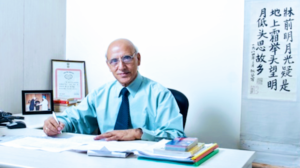Galwan not a Chinese word; Not found in ‘Ci Hai’, the treasure house of Chinese words
In my 45 + year long study of Chinese language and China analysis, I have not come across a word like “Galwan” in any Chinese Vocabulary not even in ‘Ci Hai’, the treasure house of Chinese words: Prof Ashok Tiku
By Prof Ashok Tiku
Coming from Kashmir, I would like to through some light on the Galwan valley issue, which is also a part of this struggle to occupy leadership positions in the Central Military Commission (CMC) in China.
China’s claim to Galwan valley is a figment of the imagination and it had accepted Galwan as part of India as early as 1959. Historically it has been part of Jammu and Kashmir. Galwans is a household name in Kashmir who were famous for giving money to the poor as against the chaks.
They are mainly concentrated in Trehgam, Awantipora, Shopian, Bandipora, etc. Galwan village also exists in the Badgam District of Kashmir. These good build people have a sense of morality, not as a bully but in a positive context. The common phrase in the Kashmiri language is “su chu yehayi galwan hyuh” meaning he is like a Galwan, a complement for morality.
In my 45 + year-long study of Chinese language and China analysis, I have not come across a word like “Galwan” in any Chinese Vocabulary not even in ‘Ci Hai’, the treasure house of Chinese words.
Mr. Ghulam Rasool Galwan’s forefathers belonged to the famed Galwan tribe of Kashmir. The Chinese side had never claimed the valley in the past. The renewed claim is untenable and not supported by historical facts and tantamount to obliterating History and has to be resisted by all means.
The Intrusion into Galwan valley resulting in 20 Indian martyrs and several other Chinese ingresses into Chushul, Pangong Tso, Depsang Plains occupying strategic heights overlooking Darbuk-shyok-daulat Beg Oldi Road is likely to continue with two-step forward one step back policy.
It appears that the failure to project China as the “responsible stakeholder” as dreamt by western powers, failure to project “Superiority of China’s one-party rule over the Western multi-party system”, the abysmal record of human rights, BRI burden and disregard for international laws, norms, and behaviour despite “38 years of development miracle of reform and opening up “is leading China towards a greater deeper whirlpool of uncertainty.
Also read: It is in Japan’s interest also to make India economically strong against China
India needs to closely watch the gravity of both the Inner party factional struggle in CPC as well as the resultant Border provocations with utmost seriousness and preparedness. Border provocations perhaps as an attempt to divert attention to consolidate political power and achieve the goal of capturing the DBO-Karakoram pass and join up with Shaksgam valley ceded to China by Pakistan, help Pakistan capture Siachen glacier, provide depth to Aksai Chin road- china Pakistan Economic corridor passing through Pak-controlled Indian territory.
Being India’s largest neighbour, China needs greater attention in Indian policy circles. .We need to invest more in developing language expertise, specialized think tanks focussing on China polity. We cannot judge and understand healthy geopolitical outcomes by relying on biased foreign literature, reports, and propaganda material.
Right from the cold war, we seem to have been relying either on leftist or rightist views on our friends and foes. The quality of discussions over China-related issues on Indian TV channels barring some reputed army officers clearly shows a lack of in-depth knowledge. India needs long term investment in the generation of this expertise to safeguard India’s long term interests, regional stability, and global interests.
For the present, the bottom line for any dialogue and discussion has to be restoring status quo ante –verified withdrawal to pre –April 2020 positions. China’s strategy always has been to Enrich, Delay, Create pressure, and Normalise the encroachment in due course. This is not acceptable and has to be clearly communicated.
About the author:

Prof. Ashok Tiku, Former HOD, Amity School of Languages, Amity University Gurgaon is an authority on Chinese affairs with over 45 years of experience as an analyst. Born in Srinagar, Prof. Tiku did his Masters from Peking University, Beijing, and lived in China for 10 years.
Also read: Protest against Chinese President XI Jinping in Shibuya, Tokyo




Thank you professor Saab for sharing some facts unknown to the world.
Please keep updating us.
God Bless Us all